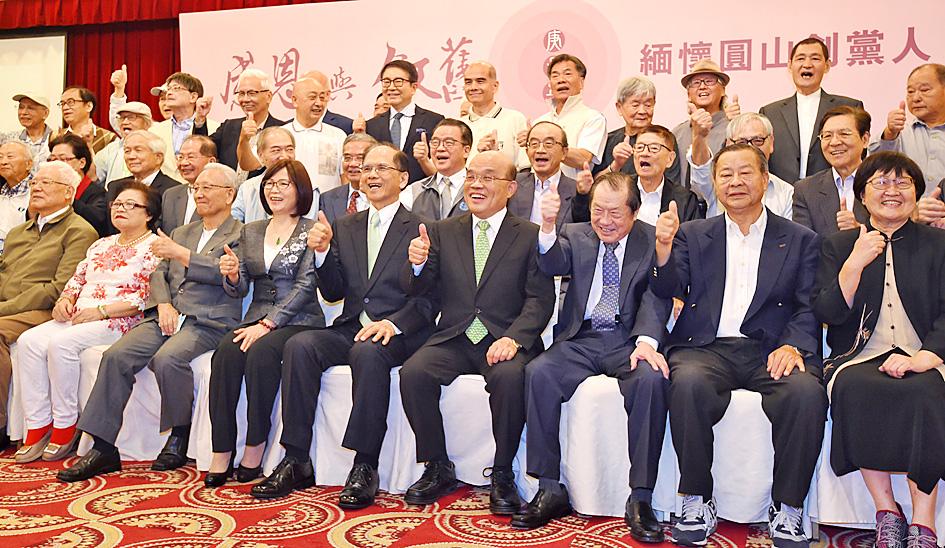Senior Democratic Progressive Party (DPP) members yesterday gathered to commemorate the party’s founders and history at Taipei’s Grand Hotel, the birthplace of the party, one day ahead of its 34th anniversary.
Speaking at the event honoring the 135 founding members of the party, Legislative Yuan Speaker You Si-kun (游錫堃), a facilitator in the establishment of the party and the event’s organizer, said that the gathering should have taken place in 2000 — when the DPP first assumed power and Taiwan saw its first change of government.
Apologizing for the overdue gathering, You said that he was happy to see the 49 “old comrades in arms” who showed up, but also sad that more than 44 late founding members could not be there.

Photo: Liu Hsin-de, Taipei Times
Founded on Sept. 28, 1986, outside the Grand Hotel, the DPP was the first democratic party in the Chinese-speaking world, playing an essential role in forming Taiwan’s unique democratic process, You said.
Taiwan’s democratic institutions are a role model for the world, he added.
It was against the backdrop of severe political oppression of the Martial Law era that the party was formed, and credit for its success goes to all Taiwanese of the 1980s, he said, adding that he is proud to be a part of that generation.
Taiwan’s “dark political period” contained countless incidents of oppression, especially during the eight years preceding the party’s establishment, including assassinations and judicial persecution, he said.
People advocating democracy or attempting to form political parties at that time faced imprisonment, You said, citing the 1960 arrest of Lei Chen (雷震) and the 1979 Kaohsiung Incident.
A democracy pioneer, Chen was arrested on Sept. 4, 1960, charged with treason and sentenced to 10 years in prison for publishing a pro-democracy magazine.
The Kaohsiung Incident, also known as the Formosa Incident, refers to a police crackdown, under the then-Chinese Nationalist Party (KMT) regime, on a rally held by Formosa Magazine and opposition politicians on Dec. 10, 1979.
Although some have said that the DPP’s establishment was silently approved, or even orchestrated, by then-president Chiang Ching-kuo (蔣經國), You said that they are mistaken.
It was the founding members who really gave birth to the party, as they showed no fear and were willing to take the risk in signing the petition to form the party, despite the then-KMT regime, he said.
Although the original petition has been lost and some of the founding members remain unidentified, they should not be forgotten, You said, adding that he and his colleagues had spent months collecting materials and reviewing old footage to identify all of the signatories.
Participants at the event can help verify some of the names, You said.
Once completed, the list would become part of the DPP’s archives documenting the history of Taiwan’s democratic development, he added.

‘DENIAL DEFENSE’: The US would increase its military presence with uncrewed ships, and submarines, while boosting defense in the Indo-Pacific, a Pete Hegseth memo said The US is reorienting its military strategy to focus primarily on deterring a potential Chinese invasion of Taiwan, a memo signed by US Secretary of Defense Pete Hegseth showed. The memo also called on Taiwan to increase its defense spending. The document, known as the “Interim National Defense Strategic Guidance,” was distributed this month and detailed the national defense plans of US President Donald Trump’s administration, an article in the Washington Post said on Saturday. It outlines how the US can prepare for a potential war with China and defend itself from threats in the “near abroad,” including Greenland and the Panama

A wild live dugong was found in Taiwan for the first time in 88 years, after it was accidentally caught by a fisher’s net on Tuesday in Yilan County’s Fenniaolin (粉鳥林). This is the first sighting of the species in Taiwan since 1937, having already been considered “extinct” in the country and considered as “vulnerable” by the International Union for Conservation of Nature. A fisher surnamed Chen (陳) went to Fenniaolin to collect the fish in his netting, but instead caught a 3m long, 500kg dugong. The fisher released the animal back into the wild, not realizing it was an endangered species at

The Chinese Nationalist Party (KMT) is maintaining close ties with Beijing, the Democratic Progressive Party (DPP) said yesterday, hours after a new round of Chinese military drills in the Taiwan Strait began. Political parties in a democracy have a responsibility to be loyal to the nation and defend its sovereignty, DPP spokesman Justin Wu (吳崢) told a news conference in Taipei. His comments came hours after Beijing announced via Chinese state media that the Chinese People’s Liberation Army’s Eastern Theater Command was holding large-scale drills simulating a multi-pronged attack on Taiwan. Contrary to the KMT’s claims that it is staunchly anti-communist, KMT Deputy

The High Prosecutors’ Office yesterday withdrew an appeal against the acquittal of a former bank manager 22 years after his death, marking Taiwan’s first instance of prosecutors rendering posthumous justice to a wrongfully convicted defendant. Chu Ching-en (諸慶恩) — formerly a manager at the Taipei branch of BNP Paribas — was in 1999 accused by Weng Mao-chung (翁茂鍾), then-president of Chia Her Industrial Co, of forging a request for a fixed deposit of US$10 million by I-Hwa Industrial Co, a subsidiary of Chia Her, which was used as collateral. Chu was ruled not guilty in the first trial, but was found guilty